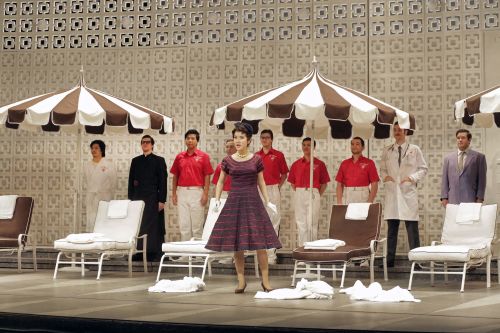 United Kingdom Dove, Rachmaninov: London Symphony Chorus/Simon Halsey with (in the Dove) Jeremy Cornes, Tom Edwards, Oliver Yates and Hugh Wilkinson (percussion); Roget Sayer and Elizabeth Burley (pianos). Barbican Hall, London, 26.11.2014 (CC)
United Kingdom Dove, Rachmaninov: London Symphony Chorus/Simon Halsey with (in the Dove) Jeremy Cornes, Tom Edwards, Oliver Yates and Hugh Wilkinson (percussion); Roget Sayer and Elizabeth Burley (pianos). Barbican Hall, London, 26.11.2014 (CC)
Dove: The Passing of the Year
Rachmaninov: All-Night Vigil (“Vespers”)
Rachmaninov’s All-Night Vigil (often referred to as “Vespers”), is one of that composer’s greatest works. Best heard performed by a choir with a characteristically Russian, deep, velvet sound, this evening presented the London Symphony Chorus. Many aspects were decidedly English and the lineage to our great choral tradition was obvious; yet there were so many magical moments, it almost compensated.
The excellence of the London Symphony Chorus is something one is in danger of taking for granted, so it was good to hear them on their own, sans LSO. The first movement, “Come, let us worship”, set out the stall with its perfectly balanced blend of voices; lyricism was the keyword for the third movement, “Blessed is the sun”. The occasional break between movements (where the chorus was allowed, briefly, to sit) helped to segment the piece into manageable chunks. The challenge of the All-Night Vigil is one of sustaining an over-arching mood: one has to await the eighth movement, “Praise the name of the Lord”, before more jaunty rhythms make themselves known.
Perhaps the most impressive movement was “The Great Doxology”, which included passages of great gentleness and tenderness. Occasionally during the course of the piece the sopranos could be rather thready, but the overall impression was impressive.
Not announced on the Barbican website, the first half consisted of Jonathan Dove’s twenty-minute 2000 piece, The Passing of the Year. Dove sets seven poems that track the course of a year, dedicating the score to his mother, “who died too young”. His choice of poets is brave: he tackles William Blake, Emily Dickinson, George Peel, Thomas Nash and Tennyson. There are echoes of Terry Riley’s minimalism in the piano-accompanied first movement (“Invocation”) which are echoed in the opening piano gesture of the second movement, “The narrow bud opens her beauties to the sun” (William Blake). There is no doubting Dove’s expertise in writing for a choir, nor of his mastery of his own musical language. But some of the score tends towards the unmemorable (“Hot sun, cool fire”, the fourth movement), leading one to play spot-the-influence (Stravinsky seems to underly some passages, particularly in the sixth movement, “Adieu! Farewell earth’s bliss!”, while that composer’s individual use of pianos and choir seems to recall Les noces).
It was the LSC that premiered this piece in the year of its composition, conducted by Stephen Westrop, at the same venue. The Passing of the Year certainly holds moments of beauty, and even Christmassy warmth. But it was rather dwarfed by the Rachmaninov in the second half.
Colin Clarke
